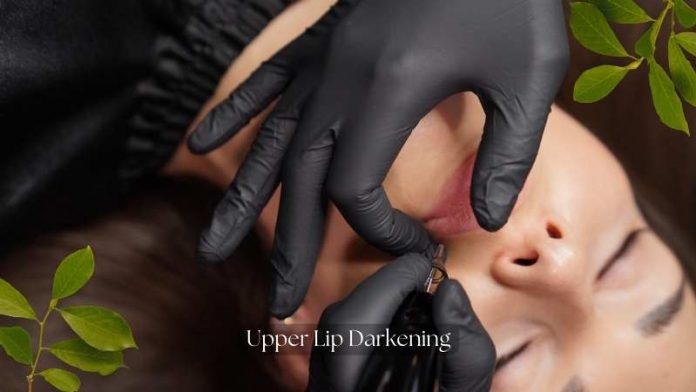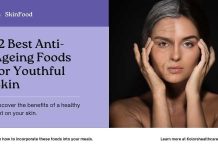Though red and rosy pouts can enhance one’s facial features, not everyone has healthy and luscious lips. You need not stock up on tinted lip balms or lipsticks when you have naturally pink lips. However, several factors like unhealthy lifestyle, smoking, medical conditions, too much application of cosmetics, and high amounts of caffeine consumption might cause dark upper lips. There is no need to panic if your upper lip skin has turned dark, as it is a common issue. Read on to learn about the causes, treatment options and preventive measures related to dark upper lip to enhance its appearance and maintain healthy pouts.
Causes of Dark Upper Lip
Several factors contribute to upper lip discolouration, which explains why you suddenly develop a dark upper lip. Some of the common causes are discussed below.
1. Hyperpigmentation
It is one of the common factors behind your dark upper lip. If you have spent much time outdoors, you might face hyperpigmentation on your upper lip due to excess UV exposure. Lip hyperpigmentation might also arise due to a hereditary genetic issue called geno dermatoses, malignant and benign neoplasm, inflammatory conditions, endocrinology conditions, use of specific medications, non-melanotic issues, and physiological changes[1].
2. Exposure to the Sun
Exposure to direct sunlight triggers excess melanin production to counteract UV ray damage. The skin of your lips is very thin and highly sensitive, making it prone to the damage caused by UV rays. As most of you might not apply sunscreen on your lips or tend to lick your upper lips frequently, the sunscreen might wear off, causing a pigmented look. Also, too much sun exposure can make your lips rough, dry and chapped, leading to darkening.
3. Changes in Hormones
Your lip gets its natural colour from a pigment called melanin. When various factors alter the levels of melanin production, it can lead to a dark upper lip. Changes in hormone levels during periods of pregnancy might cause lip discolouration. Hormonal fluctuation is common among pregnant women and some might develop a skin disorder called melasma[2], which causes dark patches on the face and upper lip[3]. Some women might develop a medical condition like Addison’s disease, which will darken the lips and other areas of the body.
4. Smoking Habit
The cigarettes you smoke contain certain chemicals, which might cause the darkening of your upper lip[4]. The tobacco used in cigarettes has nicotine[5], which is known to lower blood flow by shrinking the blood vessels in the lips, leading to a darker look[6].
5. Dehydration
Sometimes, lip dehydration causes the skin to become flaky and dry. The chapped upper lip looks dull and has a darker appearance than the lower lip. As the skin on your lips is fragile, dehydration can cause pigmentation and injury[7].
6. Frequent Biting and Licking Lips
If you have the habit of biting or licking your lips frequently, it can cause darkening of your lips. When you lick your lips often, the digestive enzymes present in saliva will damage your lips’ natural barrier, making them appear darker. If you have chapped lips, it creates an urge to bite off the flaky lip skin. It can lead to scabs and bleeding and develop dark pigmentation.
7. Improper Oral Hygiene
If someone is bedridden or feeling very weak, they might not maintain excellent oral hygiene[8]. Lack of oral hygiene might cause bacterial infection, fungal infection or oral herpes, leading to a dark upper lip.
8. Excess Caffeine Consumption
If you are an avid coffee drinker, it can also be a culprit behind your dark upper lip. Caffeine can spike your urine output levels, eventually leading to dry, dark-looking lips.
9. Medications
Medications like chemotherapy drugs and antipsychotics can cause lip hyperpigmentation. Cancer patients taking cytotoxic drugs and antipsychotic drugs might also have a dark upper lip. Chemical medications like antimalarial drugs, NSAIDs, antiarrhythmic medications, and anticonvulsants can cause darkening of your lips.
10. Deficiency of Vitamins
Vitamin deficiency can lead to upper lip darkening. If you lack vitamin B12, which is essential for producing blood cells and skin health, it can cause upper lip pigmentation[9]. Lack of Vitamins E and C, known for optimizing skin health, will also cause lip hyperpigmentation. Deficiency of iron can cause anaemia, which makes your lips appear pale and develop pigmentation[10].
Professional Treatments to Get Rid of Dark Upper Lip
Your dermatologist would suggest the necessary tests to diagnose the root cause behind the dark upper lip and then prescribe the right treatment to address it.
1. Chemical Peels
Chemical peels are an effective treatment option to get rid of pigmentation on the upper lip. Chemical peels contain chemical solutions containing glycolic acid, which gently exfoliates your dark upper lip to promote new pigment-free skin[11]. The skin of your lips is very delicate, so your dermatologist would recommend chemical peel with gentle exfoliating ingredients. Studies also show that chemical peels with glycolic acid are effective in lowering the melisma patches on the skin[12].
2. Laser Treatment for Upper Lip Pigmentation
Your dermatologist would also suggest laser treatment for treating your dark upper lip. The heat radiated by the laser equipment will target the deposition of melanin on your upper lip and lower the pigmentation effect. You can see visible differences after a couple of laser therapy sessions based on the extent of discolouration. It is a pain-free treatment, ideal for lowering pigmentation in sensitive skin areas like the upper lip.
3. Microdermabrasion for Dark Upper Lip
Your dermatologist would even suggest microdermabrasion treatment performed with the help of a device with a crystal head and rotating brush. It is designed to remove the dark skin layers on the upper lip with gentle scrubbing action to reveal new healthy skin[13]. The dead skin on your upper lip, which looks greyish and pale, will be removed to reveal pinkish skin. And it also promotes blood circulation on your lips to offer a plumper and brighter look.
4. Over The Counter Lip Products
Several OTC products are available to lighten your dark upper lip. Choose products formulated with active and effective ingredients like arbutin, kojic acid, and hydroquinone, with skin-lightening properties to reduce melanin pigment. With regular use, these products might help fade the dark look of your upper lip, based on the extent of pigmentation. However, seeking your doctor’s advice before trying these OTC medications to get the desired results is essential.
Preventive Measures to Avoid Dark Upper Lip
To get rid of dark lips and prevent it from recurring in future, it is essential to follow a few tips:
- Hydration Is Key: Drink lots of water throughout the day to keep your hydration level in check. Your lips and body must stay hydrated even when working or enjoying vacation. Carry a water bottle wherever you go to prevent dehydration, which can darken your lips.
- Choose Products with Sun Protection: Use lip balms and lipsticks with SPF 30 to shield your lips from UV exposure and prevent melanin overproduction.
- Lip Exfoliation: With the help of a toothbrush with soft bristles or a lip scrub with tiny scrub beads, exfoliate the lips to remove the dead cells. It will help brighten the lips’ appearance and give them a soft and smooth texture.
- Nourish Your Lips: Any lip product that you use must have moisturizing ingredients like shea butter, olive oil, beeswax, vitamin E, Hyaluronic acid, or coconut oil to hydrate the lips. Moisturizing your lips is essential to prevent it from getting dry and chapped.
- Ditch Smoking: If you wish to flaunt an enviable pout, then it’s time to quit smoking and alcohol consumption. It will help prevent the darkening and enhance your lips’ appearance.
- Limit Caffeine Intake: Minimizing your coffee intake and switching it to water and green tea will be beneficial to your lips. When caffeine is low in your body, it will help maintain healthy lips without causing any darkening.
- Stay Away from Home Remedies: Though it might be tempting to try any home remedies that your friends or family tell you, refraining from trying them on your lips will be beneficial. These home remedies might contain an allergic ingredient or coarsely ground particles, which might scrap the flaky skin and lead to injury or infection of the lips.
- Avoid Biting and Licking Your Lips: Though it is a common habit for many, it is essential to avoid licking or biting on the dead skin on your lips to avoid it from darkening.
When to Seek Professional Help for Dark Upper Lip
A wide range of factors causes darkening of the upper lip. If your dark lip is caused by common factors like biting lips, dehydration, smoking, drinking alcohol, or caffeine, it can be corrected by refraining from such habits. However, suppose the lip pigmentation is caused by excess melanin pigment, melasma, or hormonal changes. In that case, it is essential to consult with your dermatologist to discuss the treatment options. A perfect combination of your doctor-prescribed medications, treatment, and skincare regime will help create a dramatic difference in your lips.
Wrapping Up
The skin of the lips is very delicate and sensitive, which is why they are more prone to damage than other parts of your face. However, a dark upper lip should not be an issue of concern, as it can be cured and rectified in no time. When dealing with a dark upper lip, do not feel low, lose confidence or feel embarrassed when meeting your friends. With advanced cosmetic treatments, it is now possible to flaunt healthy and pink lips free from pigmentation. If you want a quick solution to end the unsightly dark upper lip, contact the dermatologist at Kolors Healthcare to find the root cause and get the right lip treatment. Maintain well-nourished and healthy lips by moisturizing, exfoliating, and staying hydrated.
References
- Division of Dermatology, Faculty of Medicine, Ramathibodi Hospital, Mahidol University, Bangkok, Thailand. – https://pubmed.ncbi.nlm.nih.gov/22715817/
- Hajira Basit, Kiran V. Godse, Ahmad M. Al Aboud (Brookdale University, D Y Patil University, King Abdullah Medical City) – https://www.ncbi.nlm.nih.gov/books/NBK459271/
- Ronald O. Perelman Department of Dermatology, New York University, New York, NY USA – https://www.ncbi.nlm.nih.gov/pmc/articles/PMC5574745/
- Senior Lecturer, Department of Public Health Dentistry, Chhattisgarh Dental College and Research Institute, Rajnandgaon, India – https://www.ncbi.nlm.nih.gov/pmc/articles/PMC3905564/
- Carmen Natali, MD, James L. Curtis, MD, Luis Suarez, MD, and Ernest J. Millman, PhD New York – https://www.ncbi.nlm.nih.gov/pmc/articles/PMC2627082/pdf/jnma00883-0072.pdf
- Department of Dermatology-Phlebology, University Hospital of Montpellier, Hôpital Saint-Eloi, Montpellier, France – https://pubmed.ncbi.nlm.nih.gov/11705252/
- Kory Taylor, Elizabeth B. Jones (UT Health Science Center at Houston, McGovern Medical School) – https://www.ncbi.nlm.nih.gov/books/NBK555956/
- Department of Restorative Dental Medicine and Endodontics, School of Medicine, University of Split, 21000 Split, Croatia – https://www.ncbi.nlm.nih.gov/pmc/articles/PMC8872387/
- Diana Voloshyna, School of Medicine, University of Michigan, Ann Arbor, USA – https://www.ncbi.nlm.nih.gov/pmc/articles/PMC9551622/
- Department of Haematology-Oncology, National University Cancer Institute, Singapore – https://www.ncbi.nlm.nih.gov/pmc/articles/PMC5435849/
- Skinfiniti Aesthetic Skin and Laser Clinic, Mumbai, India – https://www.ncbi.nlm.nih.gov/pmc/articles/PMC3875240/
- Jaishree Sharad, (Clinical Cosmetic and Investigational Dermatology) – https://www.researchgate.net/publication/259628237_Glycolic_acid_peel_therapy_-_A_current_review
- Oren Weissman MD, Department of Plastic and Reconstructive Surgery, Sheba Medical Center, Tel-Hashomer – https://jddonline.com









